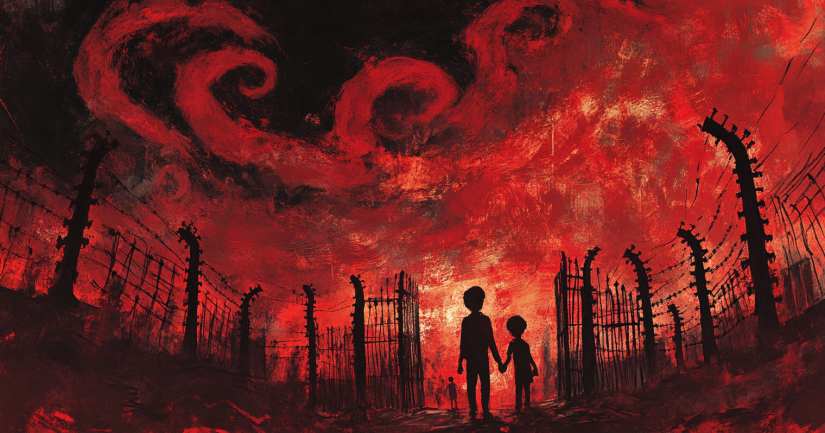
Reflect on the emotional weight of survival with Night Chapter 3 Quiz, testing your understanding of this crucial chapter. This quiz invites you to explore the profound experiences of Eliezer as he navigates life in the concentration camps. In this chapter, Wiesel paints a vivid picture of despair and resilience. You will engage with themes of survival, faith, and humanity under duress.
As you journey through these questions, you will uncover the harsh realities that Eliezer faced. This is more than just a test of memory; it is an opportunity to reflect on the enduring spirit of those who suffered. Each question will challenge your understanding of the text and offer new insights into Wiesel’s powerful narrative.
The nightmare deepens as Elie enters the concentration camp—are you following every moment? Continue with Night Chapter 4 Quiz. Need to recall how it all started? Revisit Night Chapter 2 Quiz. And for the final challenge, see if you can ace Night Full Book Quiz!
Prepare to question and ponder. What does it mean to hold onto hope? How does one maintain identity amidst chaos? The answers lie within the pages of Night. This quiz will deepen your appreciation for Wiesel’s work and expand your grasp of its themes. Engage with the text, and let the lessons of Night illuminate your own understanding of resilience and human dignity.
Night by Elie Wiesel Quizzes: Examine the powerful themes of survival and loss …
What Happened – Night Chapter 3
Elie and his family arrive at Birkenau, the reception center for Auschwitz. Men and women are separated upon arrival. Elie is separated from his mother and sister but stays with his father. They are told to lie about their ages to avoid being killed immediately. An inmate advises Elie to say he is older and his father to say he is younger.
The new prisoners undergo a selection process where they are either sent to work or to the gas chambers. Elie and his father pass the selection. They witness the burning of bodies, including children, in large pits. This sight deeply affects Elie.
The prisoners are then forced to strip, shave their heads, and disinfect. They receive prison uniforms and are taken to barracks. Elie and his father are assigned to Block 17. They are given food, which is a small ration of bread and soup.
The prisoners are forced to stand for long hours during roll call. They are constantly yelled at by the guards. Elie and his father try to stay together and support each other. They meet other prisoners who share their experiences.
Elie starts to question his faith due to the horrors he witnesses. The chapter ends with the prisoners being marched to Auschwitz, where they will begin forced labor. Elie and his father remain together, trying to survive the harsh conditions.
Night Chapter 3 – Quotes
- “I became A-7713. From then on, I had no other name.” – Eliezer, ‘Reflecting on the dehumanization process upon entering Auschwitz.’
“Never shall I forget that night, the first night in camp, which has turned my life into one long night, seven times cursed and seven times sealed.” – Eliezer, ‘Describing his first traumatic night in the concentration camp.’
“I was face-to-face with the Angel of Death.” – Eliezer, ‘Recounting his close encounter with death during the selection process.’
“The world? The world is not interested in us.” – Eliezer, ‘Expressing despair and the feeling of abandonment by the outside world.’
“Here, every man has to fight for himself and not think of anyone else.” – Veteran inmate, ‘Advising newcomers on the brutal survival tactics necessary in the camp.’
“For the first time, I felt anger rising within me. Why should I sanctify His name?” – Eliezer, ‘Questioning his faith in God amidst suffering.’
“We were masters of nature, masters of the world. We had forgotten everything—death, fatigue, our natural needs.” – Eliezer, ‘Describing the fleeting empowerment felt during forced marches.’
“How could I say to Him: Blessed be Thou, Almighty, Master of the Universe, who chose us among all nations to be tortured day and night.” – Eliezer, ‘Confronting his crisis of faith during Rosh Hashanah.’
Night Chapter 3 – FAQ
Chapter 3 centers on Elie Wiesel’s arrival at Auschwitz-Birkenau, detailing the initial selection process, separation from his family, and the brutal camp life. It marks the start of Wiesel’s transformation and survival struggle.
Wiesel describes Auschwitz as a place of horror and despair. His impressions are filled with fear and confusion amid dehumanizing conditions and the atrocities’ scale. Vivid imagery conveys the prisoners’ shock and disbelief.
The selection process is a brutal evaluation determining prisoners’ fates. Men and women are separated, with those unfit for work sent to death. For Wiesel, it is a pivotal moment witnessing the loss of his mother and sister, marking an emotional turning point.
Chapter 3 explores identity and loss through the stripping away of individual identities. Prisoners become numbers, and personal belongings are taken. It captures the emotional toll of losing family, name, and humanity, highlighting the dehumanizing Holocaust experience.
Faith becomes a complex theme as Wiesel grapples with the witnessed atrocities. His faith is profoundly challenged, illustrating inner turmoil and the start of his spiritual struggle as he questions God’s presence and justice amid suffering
